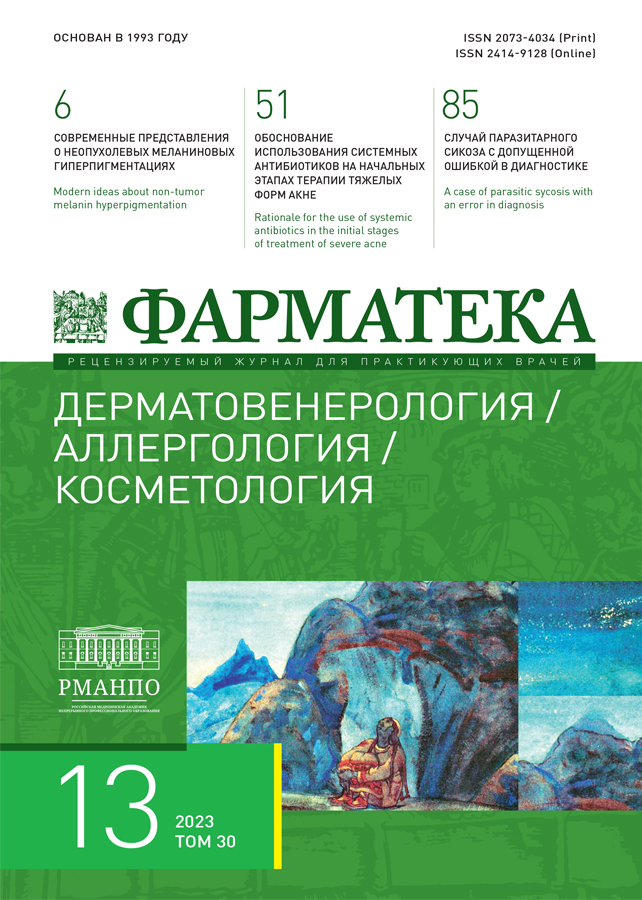Rationale for the use of systemic antibiotics in the initial stages of treatment of severe acne
- 作者: Olkhovskaya K.B.1
-
隶属关系:
- A.I. Yevdokimov Moscow State University of Medicine and Dentistry
- 期: 卷 30, 编号 13 (2023)
- 页面: 51-54
- 栏目: Original articles
- ##submission.datePublished##: 04.12.2023
- URL: https://journals.eco-vector.com/2073-4034/article/view/625930
- DOI: https://doi.org/10.18565/pharmateca.2023.13.51-54
- ID: 625930
如何引用文章
详细
Background. Treatment of severe acne is a difficult task in the daily practice of dermatovenerologists.
Objective. Determination of the effectiveness, tolerability and validity of prescribing systemic antibiotics in the early stages of treatment of patients with severe acne.
Methods. The present study scientifically validated the use of systemic antibiotics in the treatment of 52 patients with severe acne before prescribing isotretinoin.
Results. This method of patient management not only contributed to the high effectiveness of therapy, but also led to the formation of stable remission in the majority of subjects, a decrease in signs of systemic inflammatory reactions in the early stages of treatment, and most importantly, high assessment of treatment results by patients.
Conclusion. This observational study demonstrates the absolute validity of introducing systemic antibiotics into the treatment of patients with severe acne at the initial stages before prescribing systemic isotretinoin.
全文:
作者简介
K. Olkhovskaya
A.I. Yevdokimov Moscow State University of Medicine and Dentistry
编辑信件的主要联系方式.
Email: olhovskaya_kira@mail.ru
ORCID iD: 0000-0003-4920-5288
Cand. Sci. (Med.), Associate Professor at the Department of Skin and Sexually Transmitted Diseases
俄罗斯联邦, Moscow参考
- Heng A.H.S., Chew F.T. Systematic review of the epidemiology of acne vulgaris. Sci Rep. 2020;10(1):5754.
- Firlej E., Kowalska W., Szymaszek K., et al. The Role of Skin Immune System in Acne. J Clin Med. 2022;11:1579.
- Samuels D.V., Rosenthal R., Lin R., et al. Acne vulgaris and risk of depression and anxiety: a meta-analytic review. J Am Acad Dermatol. 2020;83(2):532–41.
- Alsulaimani H., Kokandi A., Khawandanh S., et al. Severity of acne vulgaris: comparison of two assessment methods. Clin Cosmet Investig Dermatol. 2020;13:711–16.
- Lim D.T., James N.M., Hassan S., Khan M.A. Spondyloarthritis associated with acne conglobata, hidradenitis suppurativa and dissecting cellulitis of the scalp: a review with illustrative cases. Curr Rheumatol Rep. 2013;15:346.
- Аравийская Е.Р., Самцов А.В., Соколовский Е.В. и др. К вопросу об оценке по степени тяжести и классификации акне. Вестник дерматологии и венерологии. 2022;98(6):48–54. [Arabian E.R., Samtsov A.V., Sokolovsky E.V. and others. On the issue of assessing the severity and classification of acne. Vestnik dermatologii i venerologii. 2022;98(6):48–54. (In Russ.)].
- Doshi A., Zaheer A., Stiller M.J. A Comparison of Current Acne Grading Systems and Proposal of a Novel System. Int J Dermatol. 1997;36:416–18.











